Department of Education
Training courses
Since the beginning of its activity, EUCENTRE aims to promote and support training and research in the field of seismic risk reduction, through various actions, including the training of operators with strong scientific and professional skills in the field of earthquake engineering. The training topics include seismology, geology, geotechnics, behaviour of materials and structures, structural analysis, design of new structures, assessment and retrofitting of existing structures, assessment and drafting of emergency and civil protection plans, even in emergency scenarios. To that end, EUCENTRE organizes 8-hour short courses and seminars.
In particular, these courses are addressed to practitioners, technicians and public servants operating in the construction and planning sector who are interested in learning more about the issues and problems related to the behaviour of structures in seismic areas, as well as acquiring the necessary tools to design and assess these structures. The training activities are also addressed to the public administrations interested in investigating the issues of emergency planning.

Titles of some of the short courses and seminars organised from 2004 to 2019:
- Analysis, modeling and assessment of timber structures;
- Analysis and modeling of monumental structures: historic buildings, vaults and domes;
- Vulnerability and damage assessment of cultural heritage;
- Masonry infills subject to seismic action: from experimentation to design;
- Seismic design of steel structures;
- Analysis, modeling and assessment of steel structures;
- Connections in steel buildings in seismic areas;
- Composite steel-concrete structures;
- Analysis, modeling, assessment and retrofitting in reinforced concrete structures and infrastructures;
- Analysis, modeling and assessment of existing reinforced concrete buildings;
- Displacement-based design of reinforced concrete buildings;
- Innovative materials for structures: high performance concrete, FRP bars, profiles and sheets;
- Seismic design of isolated structures;
- Assessment of the seismic vulnerability of structures and non-structural elements through simplified methods;
- Sismabonus;
- Earthquake and non-structural elements: approaches, codes, assessment and performances;
- Industrial metal shelving;
- Seismic analysis and assessment of shells and tanks;
- Analysis of the seismic vulnerability of steel tanks;
- Analysis, modeling, assessment and retrofitting of bridges;
- Design and assessment of industrial facilities and multi-storey precast buildings in seismic areas;
- Design of interventions for the retrofitting of precast industrial facilities;
- Experimental techniques and diagnostic investigations for the rapid assessment of structures;
- Standard and innovative methodologies for the retrofitting of structures;
- Non-linear modeling and analysis of structures;
- Non-linear mechanics of structures: methods, models and applications;
- Dynamic identification and continuous structural monitoring based on vibrations;
- Effects of vibrations on structures and people: measurement techniques and assessment methods;
- Extreme actions on constructions;
- The direction of the works, the static testing in progress of the structural works and the load tests on the structures;
- Probabilistic analysis of seismic hazard;
- Hazard, seismic risk and building codes;
- International codes for structures;
- Selection of the seismic input: principles, methods and tools;
- Seismic hazard and design level earthquakes : seismic input selection strategies for non-linear analysis of structures;
- Building failures, collapses and elements of forensic engineering;
- The hydrogeological instability;
- Seismic design of foundations;
- Advanced numerical modeling in geotechnical engineering;
- Hydrogeological risk: structural and non-structural mitigation of landslides;
- Building Information Modeling: the tools and procedures for digitizing the order.
[easy-social-share buttons=”facebook,twitter,google,pinterest,linkedin,whatsapp” counters=0 style=”icon” point_type=”simple”]
 Eucentre is a non-profit private law foundation whose mission is to conduct research and provide training and services in earthquake and safety engineering
Eucentre is a non-profit private law foundation whose mission is to conduct research and provide training and services in earthquake and safety engineering  Eucentre promotes science, research and innovation for the benefit of the community, offering targeted methodologies and concrete solutions for prevention, safety and resilience. It collaborates with institutions and companies to disseminate competencies for the common good.
Eucentre promotes science, research and innovation for the benefit of the community, offering targeted methodologies and concrete solutions for prevention, safety and resilience. It collaborates with institutions and companies to disseminate competencies for the common good. Eucentre conducts earthquake engineering research and risk reduction studies via laboratory testing and numerical analysis to enhance seismic performance and develop innovative solutions
Eucentre conducts earthquake engineering research and risk reduction studies via laboratory testing and numerical analysis to enhance seismic performance and develop innovative solutions  Eucentre carries out research activities in earthquake engineering and risk reduction through laboratory testing and numerical analysis, aiming to improve the seismic performance of structures and soils and to develop innovative seismic retrofitting techniques.
Eucentre carries out research activities in earthquake engineering and risk reduction through laboratory testing and numerical analysis, aiming to improve the seismic performance of structures and soils and to develop innovative seismic retrofitting techniques. The Foundation promotes diverse and high-quality training activities aimed at academic and professional contexts, with constantly updated and innovative programs and initiatives designed to meet the evolving needs of the sector and society
The Foundation promotes diverse and high-quality training activities aimed at academic and professional contexts, with constantly updated and innovative programs and initiatives designed to meet the evolving needs of the sector and society  Eucentre ensures communication aimed at informing institutions, professionals, and citizens about ongoing activities and projects, with the goal of disseminating useful and accessible content and knowledge. It contributes to promoting a shared and informed culture of prevention and resilience.
Eucentre ensures communication aimed at informing institutions, professionals, and citizens about ongoing activities and projects, with the goal of disseminating useful and accessible content and knowledge. It contributes to promoting a shared and informed culture of prevention and resilience.

